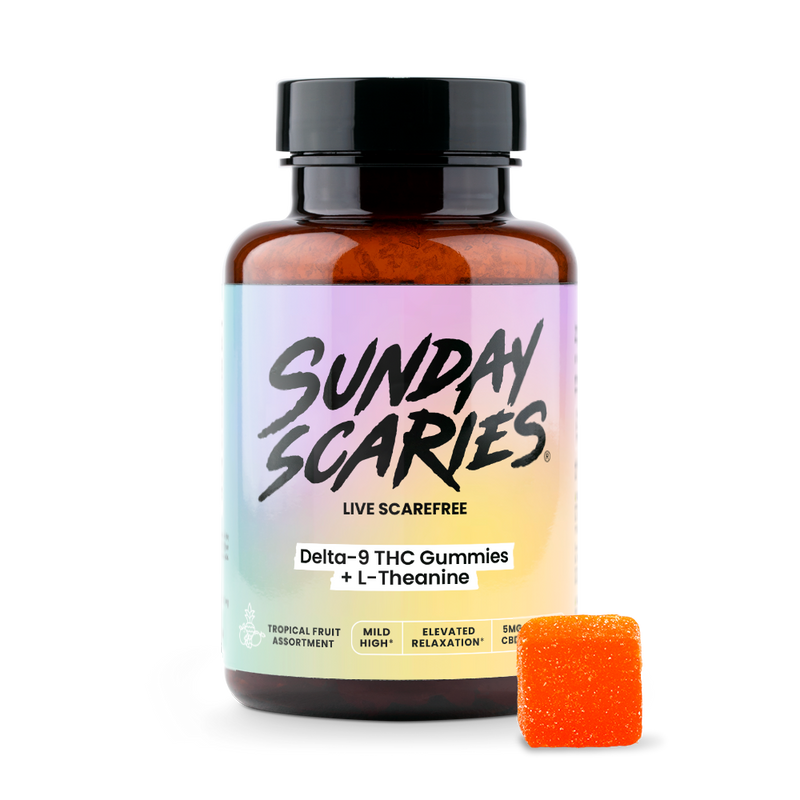
What Is Delta 9 THC? Benefits, Risks, and Legal Status Explained

Delta-9, or Delta-9-tetrahydrocannabinol (Delta-9 THC), is the primary psychoactive compound in cannabis responsible for its euphoric effects. This cannabinoid interacts with the body's endocannabinoid system, influencing mood, perception, and various physiological processes and it's known for getting you "high".
But there’s much more to this compound than just its intoxicating effects. This article delves into the history, chemistry, effects, benefits, and legal status of Delta-9 THC to provide a comprehensive understanding of this fascinating cannabinoid.
Key Takeaways
-
Delta 9 THC is the primary psychoactive component of cannabis, known for its euphoric effects, and it interacts with the body’s endocannabinoid system, specifically CB1 and CB2 receptors.
-
Delta 9 THC is being studied for its medicinal purposes including pain relief, and treatment of sleep disorders, but it requires cautious use under professional supervision due to potential side effects.
-
The legal status of Delta 9 THC varies; while hemp-derived Delta 9 THC with less than 0.3% concentration is legal under federal law, higher concentrations remain illegal and state laws differ widely on its use.
Understanding Delta-9 THC
Delta 9 THC, the predominant and well-known cannabinoid in cannabis plants, triggers the euphoric “high” linked with marijuana or hemp use.
Differing from CBD, another prevalent cannabinoid, Delta THC 9 has intoxicating effects, necessitating an understanding of its properties and impacts prior to use in a cannabis plant.
For both medical or recreational purposes, familiarity with how Delta 9 THC interacts with the body can greatly influence its safe and effective utilization.
Effects of Delta-9 THC
The effects of Delta-9 can vary widely depending on factors such as the dose, method of consumption, individual tolerance, and the presence of other cannabinoids and terpenes.
Common effects of Delta-9 reported by users include:
1. Euphoria and Relaxation: Delta-9 is known for inducing feelings of euphoria and relaxation. This is often described as a "high" and can be accompanied by an uplifted mood and a sense of well-being.
2. Altered Perception: Users may experience changes in perception, such as enhanced sensory experiences, altered time perception, and heightened creativity.
3. Increased Appetite: Delta-9 is known to stimulate appetite, often referred to as the "munchies." This can be beneficial for individuals with conditions that cause appetite loss and can be considered both good or bad with daily marijuana use.
4. Pain Relief: Delta-9 THC is being studied for its analgesic properties and potential ability to help alleviate pain. It is commonly used by individuals with chronic pain conditions, although these potential medical benefits need to be studied more before definitive claims can be made.
5. Relaxation and Stress Relief: Many users find that Delta-9 THC helps reduce stress, promoting relaxation and calmness.
Potential Risks and Side Effects of Delta-9 THC
Delta 9, despite its potential benefits, carries risks. Awareness of both short-term and long-term side effects is crucial for informed decision-making.
Comprehending these risks can aid in reducing adverse effects and promoting a safer Delta 9 experience.
Short-Term Side Effects
These effects are typically mild and manageable but can be bothersome for some users. Starting with a low dose and gradually increasing it is a recommended measure to minimize these risks.
Additionally, combining Delta 9 THC with sedative medications can enhance sleepiness and slowed breathing, so caution is advised.
Check out the short-term side effects below:
1. Dry Mouth and Red Eyes: Common side effects of Delta-9 include dry mouth (cottonmouth) and red, bloodshot eyes.
2. Increased Heart Rate: Delta-9 can cause an increased heart rate, which may be uncomfortable for some users.
3. Dizziness: Some individuals may experience dizziness, particularly when standing up quickly or at higher doses.
4. Impaired Memory and Concentration: Delta-9 can impair short-term memory and concentration, making it challenging to perform tasks that require focus and attention.
5. Altered Time Perception: Users may experience changes in their perception of time, often feeling that time is passing more slowly.
6. Paranoia and Anxiety: In some individuals, especially at higher doses, Delta-9 can induce feelings of paranoia and anxiety.
7. Euphoria and Relaxation: Delta-9 often causes euphoria and relaxation, which can be pleasant but can also impair alertness.
8. Impaired Coordination and Motor Skills: The use of Delta-9 can lead to impaired coordination and motor skills, increasing the risk of accidents.
9. Increased Appetite: Delta-9 is known to stimulate appetite, often referred to as the "munchies." Again, this can either be an unwanted side effect or a desirable main effect depending on user desire.
Long-Term Risks
Long-term use of Delta 9 THC carries significant risks, including the potential for marijuana addiction, marijuana dependence, substance use disorder, and mental health issues such as anxiety, depression, and psychosis.
Chronic use can also lead to cognitive impairments like memory loss.
Check out the long-term risks below:
1. Cannabis Use Disorder: There is a potential for developing cannabis use disorder with prolonged and heavy use of Delta-9 THC.
2. Impaired Cognitive Function: Long-term, heavy use of Delta-9 THC may impair cognitive functions, including memory, attention, and learning.
3. Respiratory Issues: Smoking cannabis can lead to respiratory issues, including chronic bronchitis and other lung problems.
4. Mental Health Impact: Long-term use of Delta-9 THC can potentially increase the risk of mental health issues, such as anxiety and depression.
5. Decreased Motivation and Productivity: Chronic use of Delta-9 THC may result in decreased motivation and productivity, affecting daily life and responsibilities.
6. Impact on Brain Development: In adolescents, prolonged use of Delta-9 THC can negatively impact brain development, potentially affecting cognitive and emotional health.
7. Cannabinoid Hyperemesis Syndrome (CHS): Heavy, long-term use of Delta-9 THC can lead to cannabinoid hyperemesis syndrome, a condition characterized by severe nausea and vomiting.
Furthermore, there is an increased risk of psychiatric conditions, including:
-
Schizophrenia
-
Psychosis
-
Anxiety disorders
-
Depression
Particularly in individuals predisposed to substance abuse disorders, including marijuana abuse, recognizing these risks is vital for those contemplating long-term use of Delta 9 THC.
The History of Delta-9 THC
The use of cannabis sativa dates back thousands of years, with ancient civilizations utilizing the hemp plants for various purposes, including medicinal, recreational, and spiritual practices.
However, it wasn’t until the mid-20th century that scientists isolated and identified Delta-9 THC as the primary psychoactive component in cannabis.
In 1964, Dr. Raphael Mechoulam and his team of researchers at the Hebrew University in Jerusalem successfully isolated and synthesized Delta-9 THC, marking a significant milestone in cannabis research.
This discovery paved the way for a deeper understanding of how cannabinoids interact with the human body and laid the foundation for modern cannabis science.
The Chemical Structure of Delta-9 THC
Delta-9 THC belongs to a class of compounds known as cannabinoids, which are unique to the cannabis plant.
Chemically, Delta-9 THC is classified as a terpene phenolic compound. Its molecular formula is C21H30O2, and it has a molecular weight of 314.45 g/mol. The structure of Delta-9 features a tricyclic 21-carbon ring system, with a double bond located at the ninth carbon atom, which is where it gets its name.
Cannabinoids like Delta-9 THC are synthesized in the glandular trichomes of the cannabis plant. These trichomes produce a resin that contains a variety of cannabinoids, terpenes, and flavonoids, which contribute to the plant's aroma, flavor, and effects.
Unlike some cannabinoids that require complex extraction processes, Delta 9 THC can be directly extracted from the plant, making it readily available for various uses.
How Delta-9 THC Works
Delta-9 THC exerts its effects by interacting with the body's endocannabinoid system (ECS), a complex network of receptors, enzymes, and endogenous cannabinoids that play a crucial role in regulating various physiological processes, including mood, appetite, pain perception, and immune function.
The ECS consists of two primary receptors: CB1 and CB2. CB1 receptors are predominantly found in the central nervous system, including the brain, while CB2 receptors are mainly located in the peripheral nervous system and immune cells.
Delta-9 has a high affinity for CB1 receptors, which is why it produces its psychoactive effects.
When Delta-9 THC binds to CB1 receptors, it modulates the release of neurotransmitters, such as dopamine and serotonin, leading to changes in mood, perception, and behavior. This interaction is responsible for the euphoria, relaxation, and altered sensory experiences commonly associated with cannabis use.
Medical Applications of Delta-9 THC
Beyond the recreational effects of Delta 9, it is also a component of medical cannabis and displays potential in treating diverse medical conditions.
It is being studied for its ability to potentially assist with pain relief, managing chemotherapy-induced nausea, and improving sleep disorders.
Nevertheless, medical treatments still need to be classified within the FDA and cautious use under the supervision of a healthcare professional is strongly advised.
More research is needed to fully understand its benefits and limitations in medical purposes. So, please understand we are highlighting any claims, but rather discussing the potential benefits.
Pain Relief
One of the most recognized uses of Delta 9 is for pain relief. Its ability to bind to CB1 receptors may help alleviate chronic pain conditions, including neuropathic pain and fibromyalgia. Randomized clinical trials are being conducted to reveal whether or not this interaction reduces pain perception. And whether it can be a valuable tool for those suffering from persistent pain.
Prior to using Delta 9 for pain management, consulting a healthcare professional is necessary to prevent potential medication interactions.
Professional advice contributes to the safe and effective application of Delta 9.
Sleep Disorders
For individuals struggling with sleep disorders such as insomnia and sleep apnea, Delta 9 may offer a solution.
By interacting with CB1 receptors, it can modulate sleep patterns and improve sleep quality. However, the long-term effects on sleep are still under research, with some studies indicating potential disruptions.
For sleep-related issues, before using Delta 9, it’s advisable to consult a medical professional for safe and effective use.
Legal Status of Delta-9 THC
The legal status of Delta 9 THC is complex and varies significantly between federal and state levels. Federally, it remains a Schedule I controlled substance, although the 2018 Farm Bill created a distinction for hemp-derived Delta 9 THC.
Comprehending these legal nuances is vital for compliance and circumventing legal implications.
Federal Law
Under the 2018 Farm Bill, hemp-derived Delta 9 THC with a concentration of no more than 0.3% by dry weight is no longer classified as a controlled substance. However, Delta 9 THC that is marijuana-derived or found in higher concentrations in hemp plants remains illegal under federal law as a Schedule I controlled substance.
Grasping this distinction is vital for consumers to prevent legal complications.
State Laws
State laws regarding Delta 9 THC and recreational marijuana vary widely. Some states have legalized its use for both medical and recreational purposes, while others maintain strict prohibitions. Users must familiarize themselves with the laws in their specific state.
Familiarity with state laws is key to adhere to regulations and evade potential legal consequences.
Differences Between Delta-9 and Delta-8 THC
Delta 9 THC and Delta 8 THC, while similar, have distinct differences. Delta 8 THC is often considered a milder alternative, providing a less intense high.
Comprehending these differences can aid users in selecting the most suitable product for their requirements.
Chemical Differences
The primary difference between Delta 8 and Delta 9 THC lies in the location of their double bonds. Delta 8 has the double bond on the eighth carbon, while Delta 9 has it on the ninth carbon. This small structural variation results in different properties and effects.
Effects and Potency
Delta 9 THC is known for its strong psychoactive effects, inducing a potent high. Users often experience intense euphoria and altered perception.
On the other hand, Delta 8 THC provides milder effects, often described as a clearer and less intense high. This makes Delta 8 a preferable option for those seeking the therapeutic benefits of THC without the mega-intense psychoactive effects.
Difference Between Delta-9 and THC?
Delta-9-tetrahydrocannabinol (Delta-9 THC) and THC are often used interchangeably, but it's important to understand that Delta-9 THC is a specific form of THC.
THC, or tetrahydrocannabinol, is a general term referring to the various forms of this cannabinoid found in the cannabis plant. The key difference is that Delta-9 THC is the most common and well-known form, primarily responsible for the psychoactive effects of cannabis.
THC Gummies vs. Delta-9 Gummies
When it comes to edibles, THC Gummies and Delta-9 Gummies are frequently mentioned. THC Gummies refer to edibles that contain any form of tetrahydrocannabinol, which can include Delta-8, Delta-9, or other variants.
On the other hand, Delta-9 Gummies specifically contain Delta-9 THC, ensuring that users experience the potent psychoactive effects commonly associated with traditional cannabis.
In summary, while all Delta-9 Gummies are THC Gummies, not all THC Gummies are Delta-9 Gummies.
The distinction lies in the specific type of THC used, with Delta-9 Gummies offering the classic cannabis experience.
- For more information and to further understand the differences, check out our resource: Delta 9 Gummies vs. THC Gummies
Consumption Methods of Delta-9 THC
Delta 9 THC can be ingested in multiple ways, each presenting different onset times and effect durations. The methods of consumption include:
-
Smoking
-
Vaping
-
Edibles
-
Tinctures
The method of consumption can notably shape the user’s experience.
Smoked Cannabis
Smoking is one of the most common methods of consuming Delta 9 THC, providing immediate effects. Users often feel the psychoactive impacts almost instantly, experiencing altered perception, increased focus, and euphoria.
This method is popular among recreational users for its rapid onset and how sociable smoking can be.
Edibles and Tinctures
Edibles and tinctures offer a different experience compared to smoking. The onset of effects is delayed, typically taking 30 minutes to 2 hours to manifest. However, the effects tend to last longer, providing prolonged relief or enjoyment.
These products come in various forms, including gummies, cookies, and infused beverages, making them a versatile option for many users.
Navigating Delta-9 THC Products
Given the growing market for Delta 9 THC products, prioritizing quality and safety is crucial. Consumers should opt for products from trustworthy sources that employ stringent testing methods and ensure accurate labeling.
This practice aids in avoiding potentially harmful chemicals and adhering to legal standards.
Third-Party Testing
Third-party testing, including drug tests, is key in confirming the safety and potency of Delta 9 THC products. Accessible lab results on product websites provide transparency and assurance, facilitating informed choices for consumers.
Accurate Labeling
For consumer safety and legal compliance, accurate labeling is a must. Labels should unambiguously state the amount of Delta 9 THC per serving along with other relevant information to aid users in preventing misuse and potential side effects.
Proper labeling also ensures that consumers are aware of what they are ingesting, preventing negative health outcomes or legal issues.
Summary
Understanding Delta 9 THC, from its origins and effects to its medical applications and legal status, is crucial for safe and informed use.
While it offers significant therapeutic benefits, it also carries potential risks that must be carefully managed.
By staying informed and choosing high-quality products, users can enjoy the benefits of Delta 9 THC while minimizing adverse effects.
As the landscape of cannabis use continues to evolve, knowledge remains the key to navigating its complexities safely and effectively.
Frequently Asked Questions
What is Delta 9 THC?
Delta 9 THC is the main psychoactive compound in cannabis, producing the characteristic "high" when marijuana is consumed.
What are the medical benefits of Delta 9 THC?
Delta 9 THC is being studied for potential medical benefits such as pain relief, managing chemotherapy-induced nausea, and improving sleep disorders. These are just some of its potential therapeutic advantages, although more studies need to be produced before definitive claims can be made.
What are the potential risks of using Delta 9 THC?
The potential risks of using Delta 9 THC include short-term side effects such as dry mouth and increased heart rate, as well as long-term risks like substance use disorder and mental health issues like anxiety and depression.
It's important to be aware of these potential risks before using Delta 9 THC.
Is Delta 9 THC legal?
Delta 9 THC is illegal at the federal level but can be legal in some states for medical and/or recreational use, and hemp-derived Delta 9 THC with less than 0.3% concentration is federally legal.
How can I ensure the quality of Delta 9 THC products?
To ensure the quality of Delta 9 THC products, it's important to look for reputable sources that use third-party testing and provide accurate labeling for safety and potency.
Is there Delta-9 in CBD Gummies?
Typically, CBD Gummies do not contain significant amounts of Delta-9 THC. However, if the CBD Gummies are labeled as full-spectrum, they will contain trace amounts of Delta-9 THC, as well as other cannabinoids, within legal limits.
Some products marketed as Extreme CBD Gummies might also contain small amounts of Delta-9 THC to enhance their effects.
It's important to read the labels and product descriptions carefully. For those looking for CBD Gummies for focus and concentration, it's best to choose CBD edibles that have a heavy balance of CBD and other added vitamins in order to avoid any unwanted psychoactive effects.

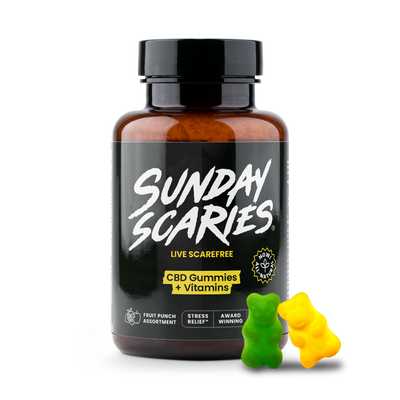 CBD Gummies
Stress Relief
CBD Gummies
Stress Relief
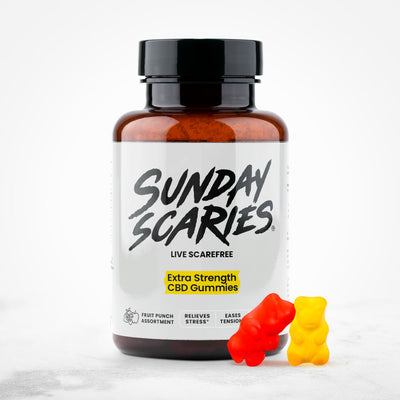 Extra Strength CBD Gummies
Stress Relief
Extra Strength CBD Gummies
Stress Relief
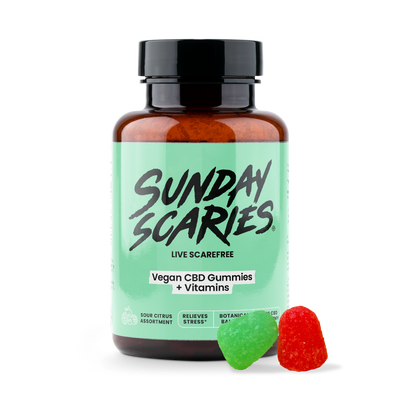 Vegan CBD Gummies
Stress Relief
Vegan CBD Gummies
Stress Relief
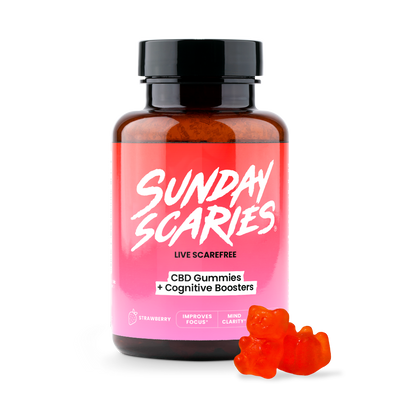 CBD Gummies for Focus
Focus Boost
CBD Gummies for Focus
Focus Boost
 CBD Candy
Mood Lift
CBD Candy
Mood Lift
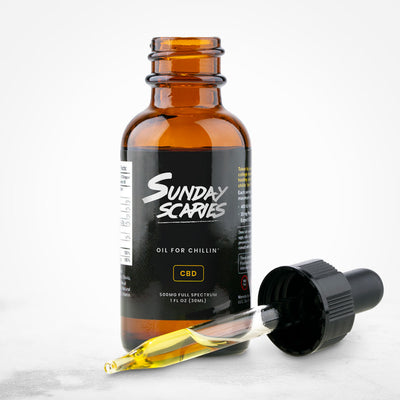 CBD Daytime Oil
Stress Relief
CBD Daytime Oil
Stress Relief
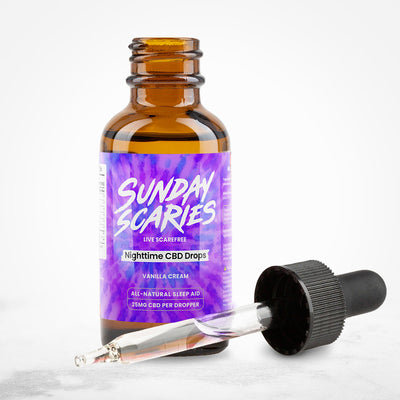 CBD Sleep Oil
Sleep Aid
CBD Sleep Oil
Sleep Aid
 CBD Dog Treats
Stress Relief
CBD Dog Treats
Stress Relief
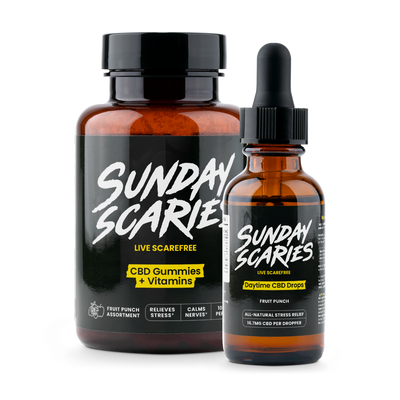 Side Piece Bundle
Stress Relief
Side Piece Bundle
Stress Relief
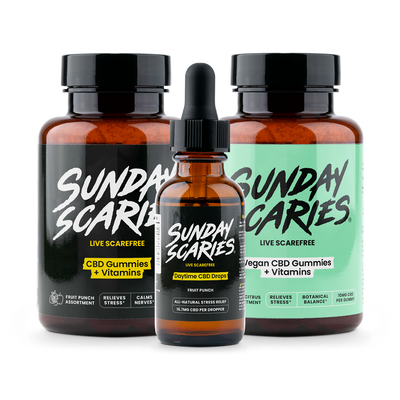 Rando Bundle
Stress Relief
Rando Bundle
Stress Relief
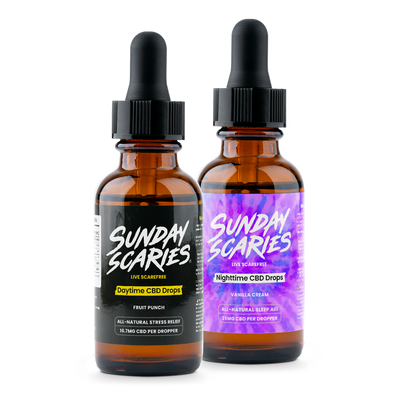 Sunrise & Sunset CBD Oil Bundle
Stress Relief
Sunrise & Sunset CBD Oil Bundle
Stress Relief
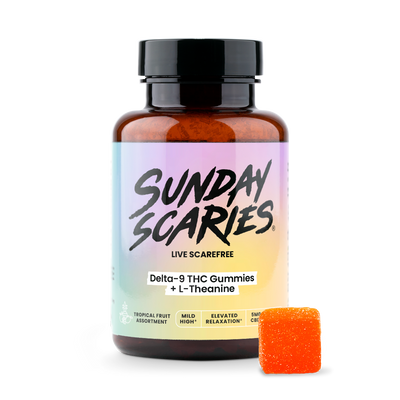 5mg Delta-9 Gummies
Euphoria
5mg Delta-9 Gummies
Euphoria
 10mg Delta-9 Gummies
Euphoria
10mg Delta-9 Gummies
Euphoria
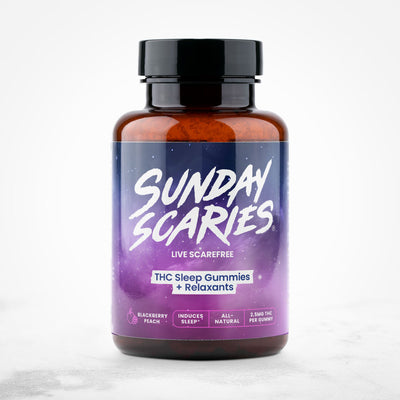 THC Gummies for Sleep
Sleep Aid
THC Gummies for Sleep
Sleep Aid
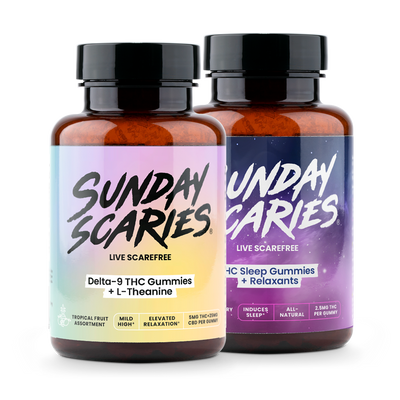 Day & Night THC Gummies Bundle
Stress Relief
Day & Night THC Gummies Bundle
Stress Relief
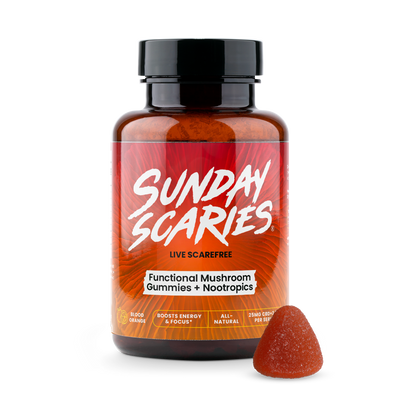 Mushroom Gummies
Focus Boost
Mushroom Gummies
Focus Boost
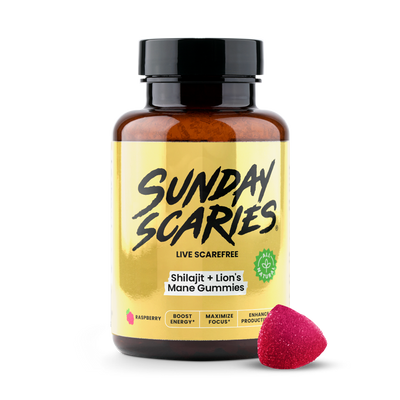 Shilajit Gummies
Focus Boost
Shilajit Gummies
Focus Boost
 Sunday Scaries Hat
Sunday Scaries Hat
 Sunday Scaries Dad Hat
Sunday Scaries Dad Hat
 Sunday Scaries T-Shirt
Sunday Scaries T-Shirt
 Sunday Scaries Pocket Tee
Sunday Scaries Pocket Tee
 Sunday Scaries Tank Top
Sunday Scaries Tank Top
 Sunday Scaries Sweatshirt
Sunday Scaries Sweatshirt
 Sunday Scaries Blanket Jacket
Sunday Scaries Blanket Jacket
 Sunday Scaries Sweatpants
Sunday Scaries Sweatpants

